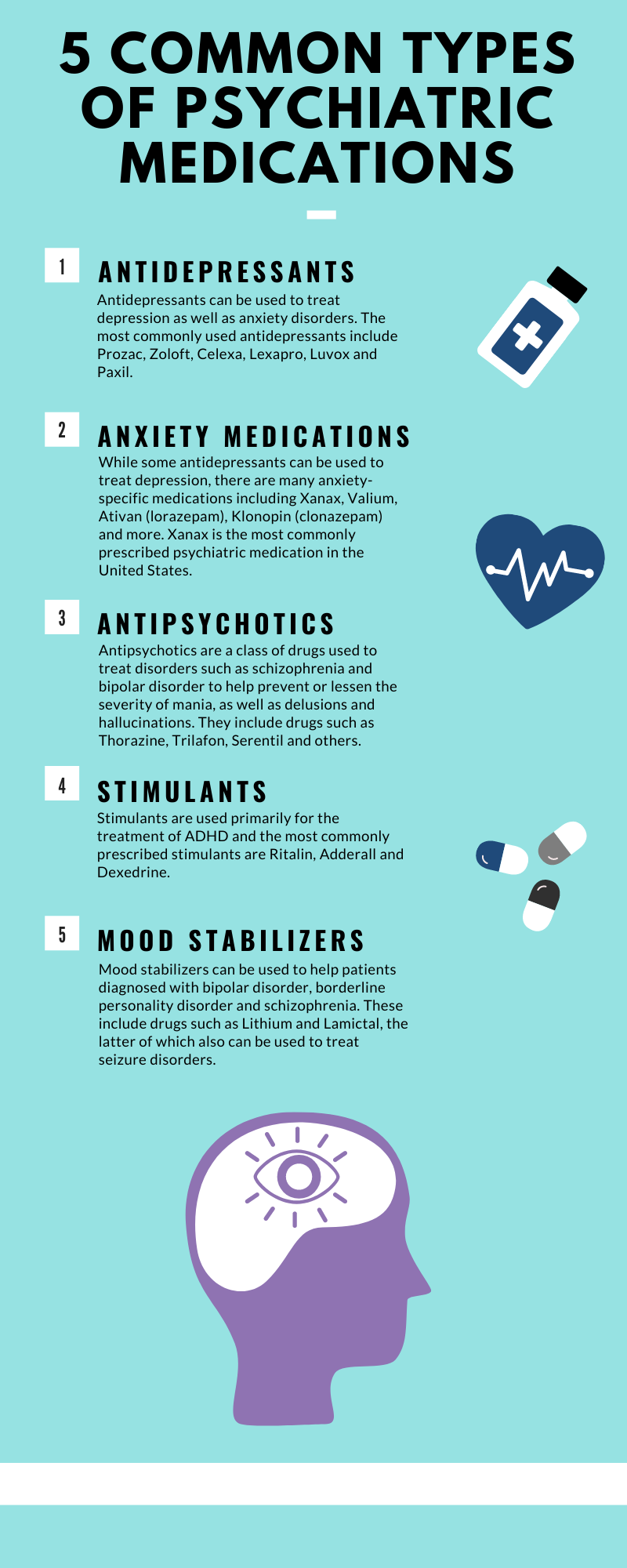|
Living with a psychiatric disorder isn’t easy, and some medications can help successfully treat many mental health conditions. As a virtual psychiatrist, I know that patients are often wary of taking medications so let’s take a look at some facts and myths about medical intervention for mental illness. Myth: Psychiatric Drugs Are Always Addictive Let’s be honest, drug addiction is an enormous problem in the United States, and many patients are understandably worried about taking a new medication, especially if they have heard rumors that these types of drugs are dangerous and addictive. However, when taken as directed, medications can alleviate symptoms of mental illness without becoming addictive. Taking a prescribed medication is absolutely not the same as recreational drug use. After all, your psychiatrist is providing you with a controlled dose of medication. If you take the medication, following the doctor’s instructions, addiction shouldn’t be an issue. However, many people who opt to not seek the help of a virtual psychiatrist and decide against taking prescribed medications end up self-medicating with alcohol and drugs, which is far more dangerous and ineffective than simply taking the prescribed dose of a medication that has been well-studied for the treatment of your particular mental health issue. Myth: Psychiatric Medications Change My Personality & Health Many people worry that these drugs will alter their personality or perhaps lower their energy levels to the point where they feel like a “zombie.” In general, this is a myth. Psychiatric medications are meant to help alleviate the symptoms of a mental health disorder and while you may no longer experience mania, anxiety or depression, you are still you and the medication won’t change that. However, it is important to note that the medications can have side effects. For instance, some medications might suppress the appetite, so you will need to make sure, if this occurs, that you still eat a healthy, balanced diet. Additionally, if you do find that your medications make you feel exceptionally tired or that you have “brain fog” or other issues, please talk with your virtual psychiatrist as you may need to adjust the dosage of your medication or perhaps try a different medication. Some common side effects, such as nausea, dizziness or fatigue, do tend to subside as your body gets used to the medication. Your psychiatrist should go over, in detail, the common side effects of these medications and how to manage these side effects in general. Usually, the side effects are far less difficult to deal with than the symptoms you deal with from depression, anxiety, bipolar disorder or any other mental health issue. Myth: Medications Aren’t Really Necessary As an experienced virtual psychiatrist, I don’t always reach for the prescription pad for every patient. In some cases, I might recommend a different type of treatment, such as EMDR treatments or a ketamine treatment rather than prescribing medication. Sometimes cognitive behavioral therapy or even meditation can be used to lessen symptoms. However, it’s important to keep in mind that mental health disorders are biological problems, and, in many cases, medications are the best treatment for these issues. Many patients feel weak for using medications to help with their symptoms, but would you think that someone with asthma was weak for using an inhaler? Would you think someone with high blood pressure was weak for using medication? Of course not. There’s no reason to feel shame for using medication to help you alleviate symptoms of depression, anxiety, bipolar disorder, ADHD or any other mental health disorder. If these medications help you live a happier, healthier life, that’s all that matters. While medications do help people manage the symptoms of mental illness, I also typically recommend concurrent therapies, such as behavioral therapy and talk therapy as it’s smart to use as many tools as possible to help you achieve long-term success. I also recommend that my patients schedule regular exercise, eat healthy meals and try to get a good night’s sleep whenever possible as a combination of all of these strategies can yield the best results. As a virtual psychiatrist, I am a mental health professional as well as a medical doctor. This means, during the diagnostic process, I will consider your physical health as well as your mental health issues. Often, we need to address physical issues, such as chronic pain, in addition to your anxiety or depression or bipolar disorder. It is important to treat the whole person and all of their co-occurring disorders. Types of Psychiatric Medications In the chart below, there are five basic categories of psychiatric medications, take a quick look and then we will dive into some facts about the most commonly prescribed drugs for specific mental health issues. Antidepressants – As the name suggests, antidepressants are used to treat depression and there are several different classes of antidepressants, most commonly selective serotonin reuptake inhibitors (SSRIs) and Serotonin norepinephrine reuptake inhibitors (SNRIs), as well as monoamine oxidase inhibitors (MAOIs). The latter two often are used when SSRI drugs are not working. Antidepressants also can be used to treat some anxiety disorders, especially SSRIs, as these drugs boost the serotonin levels in the brain, which often reduces anxiety as well as helping to alleviate symptoms of depression. Zoloft and Prozac are two of the most common brands of antidepressants, and two of the most prescribed medications in the United States. Celexa is another commonly prescribed SSRI, and Cymbalta is one of the most commonly prescribed SNRIs. In addition to antidepressants, some people with severe depression and treatment-resistant depression might consider ketamine treatments. Ketamine, when used in a prescribed manner using proper medical protocols in a doctor’s office, has shown success for some patients with treatment-resistant depression. Anxiety Medications – There are many different types of anxiety medications, and some are used to treat issues such as generalized anxiety disorder while others are taken as a treatment for panic attacks. Xanax is the most commonly prescribed anxiety medication, and it is a treatment that you would take every day. Some anxiety medications, on the other hand, are meant to be taken during times of extreme anxiety or panic. Some patients will take a long-term drug to control general anxiety or a panic disorder and have another medicine on hand essentially as a “rescue” medication if a panic attack occurs. For all patients with anxiety or panic disorders, it is important to combine medication with behavioral therapy tactics that help you manage your symptoms as effectively as possible. Antipsychotic Medications – This class of medication is meant for the treatment of disorders such as bipolar disorder and schizophrenia. There are two types of these drugs – Typical & Atypical. The “typical” antipsychotics tend to be older drugs such as Thorazine and haloperidol, which have been around for more than 70 years. While these typical antipsychotics can be helpful, they can have severe side effects for some patients. Atypical antipsychotics, such as clozapine and risperidone, tend to produce fewer side effects, which is why they are more commonly used these days as treatment than the “typical” class of antipsychotics. Still, in some cases, the older “typical” drugs are used. Stimulants – While there are myths circulating around many types of psychiatric drugs, stimulants tend to be the most controversial. These drugs, such as Ritalin and Adderall are used for the treatment of ADHD. Of course, we all hear about these two drugs being used recreationally, but, when used as prescribed, they can be highly beneficial for the treatment of ADHD. Let’s go back to the earlier example of a person with asthma using an inhaler. The inhaler, when used for the treatment of asthma, is a safe and effective treatment. If a person without asthma used this drug, it could be dangerous. Stimulants are just the same. If used by a person with ADHD, as directed and prescribed, these drugs can help improve concentration and focus and make life much easier. Mood Stabilizers – For people with disorders such as borderline personality disorder, bipolar disorder and schizophrenia, mood stabilizers can be very helpful with the regulation of mood shifts. These drugs actually are anticonvulsant medications and are also used to treat those with seizure disorders and epilepsy. Lithium and Lamictal are two common types of mood stabilizers. Often these drugs are used in conjunction with other medications to help manage a variety of symptoms. Medication Tips First and foremost, it is crucial that you always take your medications as directed by your physician. With many types of psychiatric medications, you cannot simply quit taking the medication, you need to taper off and you should not increase the dosage without talking to your psychiatrist first. With many of these medications, you need to avoid using alcohol and other drugs. Alcohol mixed with some psychiatric medications can be very dangerous. However, there are other possible drug interactions of which you need to be aware. For instance, with some SSRI drugs, it is not recommended that you use ibuprofen or some allergy medications, such as Benadryl. Your virtual psychiatrist should provide you with a list of common drug interactions, but you also can talk with your personal physician and often a pharmacist if you have any concerns. It is recommended before taking any over-the-counter medications or prescription medications that you do some research to ensure that all of these meds are safe to take together. Also, if you become pregnant or are breastfeeding, be sure to talk with your doctor about which medications are the safest options for you. If you find that some of your medications make you drowsy or nauseous, it can be smart to take the medication at night, if possible. Nausea tends to fade as your body gets used to a new medication, but ginger chews and ginger ale can help soothe nausea for some patients. When starting any new medication, it can be wise to create a daily diary to track symptoms and record how you feel in general. It does take several weeks for some weeks for some psychiatric medications to take effect, so you might not feel any improvement right away. Finding A Virtual Psychiatrist During the pandemic, telepsychiatry became the norm for most patients, and it can be a great option to consider. Using an online psychiatrist allows you the freedom to truly select the ideal doctor-patient match, and it doesn’t matter where the doctor is located. Many patients also prefer the ease of handling appointments virtually because they can avoid traffic and driving, and many are more comfortable in their homes than in a doctor’s office. As an experienced virtual psychiatrist, I can provide you with comprehensive treatment for many mental health disorders, including anxiety, depression, ADHD, bipolar disorder, alcoholism, drug abuse and more. Whether you need an ADHD psychiatrist, a bipolar psychiatrist, an anxiety psychiatrist or a psychiatrist for another disorder or co-occurring disorders, I can help. Give me a call today to set up a consultation and let’s work toward building a happier, healthier future for you.
0 Comments
|
AuthorDr Jesalva is a psychiatrist. He is in private practice in Thousand Oaks, CA since 1989. He successfully treats very challenging patients with varying co-occurring disorders with medications. Archives
May 2024
Categories
All
|


 RSS Feed
RSS Feed